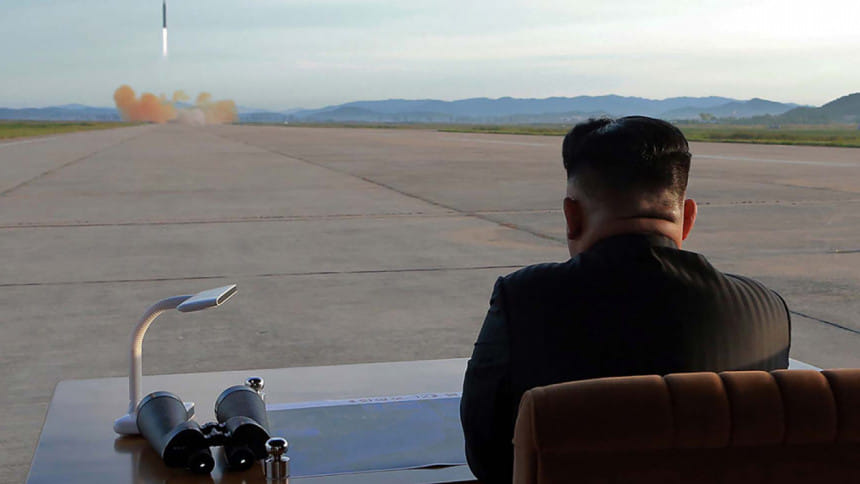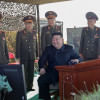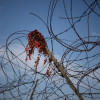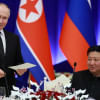Do North Korea's nuclear tests violate international law?

Owing to current affairs, I feel compelled to opine on the issue of North Korea's testing of nuclear bombs, or hydrogen bombs. Since I am unconcerned with which category of weapons North Korea tested, let us operate under the assumption that it was the earlier.
Without fodder, let me arrive at the heart of the matter—does North Korea's testing of nuclear bombs violate international law? Before answering this question, it would be helpful to define international law, which is generally accepted as laws that govern relations between nations in order to provide stability to transboundary problems. In other words, it is a set of rules for maintaining harmony between nations.
Pursuant to Article 38 of the Statute of the International Court of Justice, there are four sources of international law. In hierarchical order, they are: (1) treaties, (2) customary international law, (3) general principles of law, and (4) judicial decisions and publications of cognoscenti. Therefore, the most obvious question that arises is whether there exists a treaty that proscribes the testing of nuclear bombs, with the answer being in the affirmative.
Article 1(1) of the Comprehensive Nuclear-Test-Ban Treaty (CTBT) prohibits the testing of nuclear weapons. However, as of September 17, 2017, the CTBT, with 183 signatory nations, has not entered into force, which means that it is not part of international law. Moreover, under Annex 2 of the said treaty, there are 44 nations (Bangladesh being one) that must sign and ratify the treaty for it to enter into force. Yet, of the 44 nations, eight have yet to ratify the CTBT, with the United States and North Korea being two.
To further explain, treaties become binding upon the completion of two steps. First, a State must sign the treaty, and second, they must ratify it domestically. The process of ratification is variegated between nations. While the first step is simple, the second is where impediments present themselves. For example, in the United States, treaties are ratified when the Senate approves by a two-third vote. That is, of the 100 Senators, at least 66 must not vote against ratification. Thus, since the United States and seven other Annex 2 nations have not ratified the treaty, the CTBT has not entered into force ad nunc. This is tantamount to the nonexistence of a treaty prohibiting the testing of nuclear bombs. Therefore, North Korea's testing of nuclear bombs is not a transgression against a treaty, for there is none.
Now, to consider customary international law. Customary international law consists of (1) State practice, which is anything a State does or says, or omits to do or say; and (2) opinio juris, which is the belief that something is law. Simply stated, customary international law is that about which there exists international consensus. This engenders the questions of whether there is international consensus proscribing the testing of nuclear bombs, and what the duration of State conduct is for it to become custom. I will answer the former question in the following paragraphs. The latter's answer is unsatisfactory. As in, there is circumscribed no limitation of time—of how long conduct must persist for it to become custom. Pursuant to North Sea Continental Shelf, conduct lasting ephemerally could constitute custom, but the action must be extensive and uniform. Thus, another question arises—are States' actions extensive and uniform enough to make illegal the testing of nuclear bombs?
To illustrate this issue, let's accept that Russia disapproves of testing nuclear bombs and has consistently objected to said tests. Then, Bangladesh, Canada, and 50 other nations, over ten years, show opprobrium for such tests. Their opposition could become customary international law, leading to the inexorable result of greater consensus that nuclear bombs should not be tested de futuro. In reality, though, is this the case? Unfortunately, upon cursory research, it is yielded that the United States tested their last nuclear bomb in 1992; Russia, 1990; United Kingdom, 1991; France, 1996; China, 1996; India, 1998; and Pakistan, 1998. North Korea, on the other hand, has been testing nuclear bombs since 2006. From this summation, a logical inference can be drawn that there exists a lack of extensive and uniform State action to prohibit the testing of nuclear bombs. On a slightly different, but related, note, State's conduct in failing to ratify the CTBT can constitute insufficient consensus regarding the testing of nuclear bombs.
If the previous paragraph is not sufficiently cogent, then this will serve as the greatest clarity. Hypothetically, if there is sufficient consensus against the testing of nuclear bombs, this could be grounds—in fact, the only ground—for sanctioning the tester. Other than customary international law, the other three sources of international law are no basis for barring North Korea from testing nuclear bombs. Hence, does North Korea's testing of nuclear bombs violate international law owing to global consensus proscribing testing? After a protracted and circuitous discussion, the question is answered in the negative, for there exists no consensus that qualifies the prohibition of testing nuclear bombs as custom. In fact, this is the primary reason that the United Nations Security Council (UNSC) has strongly "condemned" the tests, but has refrained from suggesting that it is in violation of international law. In juxtaposition, the UNSC had unanimously adopted Resolution 2118 in 2013, reproaching Syria's use of chemical weapons and stating that, "[T]he use of chemical weapons constitutes a serious violation of international law."
It is crucial, however, to note the paradox. That is, one of the most censorious countries against North Korea's testing of nuclear bombs is one that has refused to ratify the CTBT—the United States. This engenders the following overarching questions: Firstly, what is the best method through which a nuclear cataclysm can be avoided? Secondly, given that the United States has not ratified the CTBT, how much credibility does the nation hold when it seeks to prevent others from testing them?
Sakif Alam is Lecturer, Department of Law, North South University.










Comments